Business Law Assignment MLC707: Contract Law Analysis
VerifiedAdded on 2022/12/15
|19
|4941
|106
Homework Assignment
AI Summary
This business law assignment, focusing on contract law, analyzes a case involving a dispute between Robert and Cameron regarding the sale of wheat. The assignment explores the essential elements of a legally binding contract, including offer, acceptance, and consideration, and determines whether a valid contract was formed. It delves into the rules of offer and acceptance, including postal rules and electronic communication, to assess the timing of contract formation and potential breach. Furthermore, the assignment examines Robert's rights against Super Supplies Ltd, considering the validity of exclusion clauses within the context of contract law. The assignment applies legal principles to the facts, providing a comprehensive analysis of contract formation, breach, and the implications of exclusion clauses, culminating in conclusions regarding the parties' rights and liabilities.

Running Head: BUSINESS LAW ASSIGNMENT 0
Business Law
MLC707
4/28/2019
Student’s Name
Business Law
MLC707
4/28/2019
Student’s Name
Paraphrase This Document
Need a fresh take? Get an instant paraphrase of this document with our AI Paraphraser
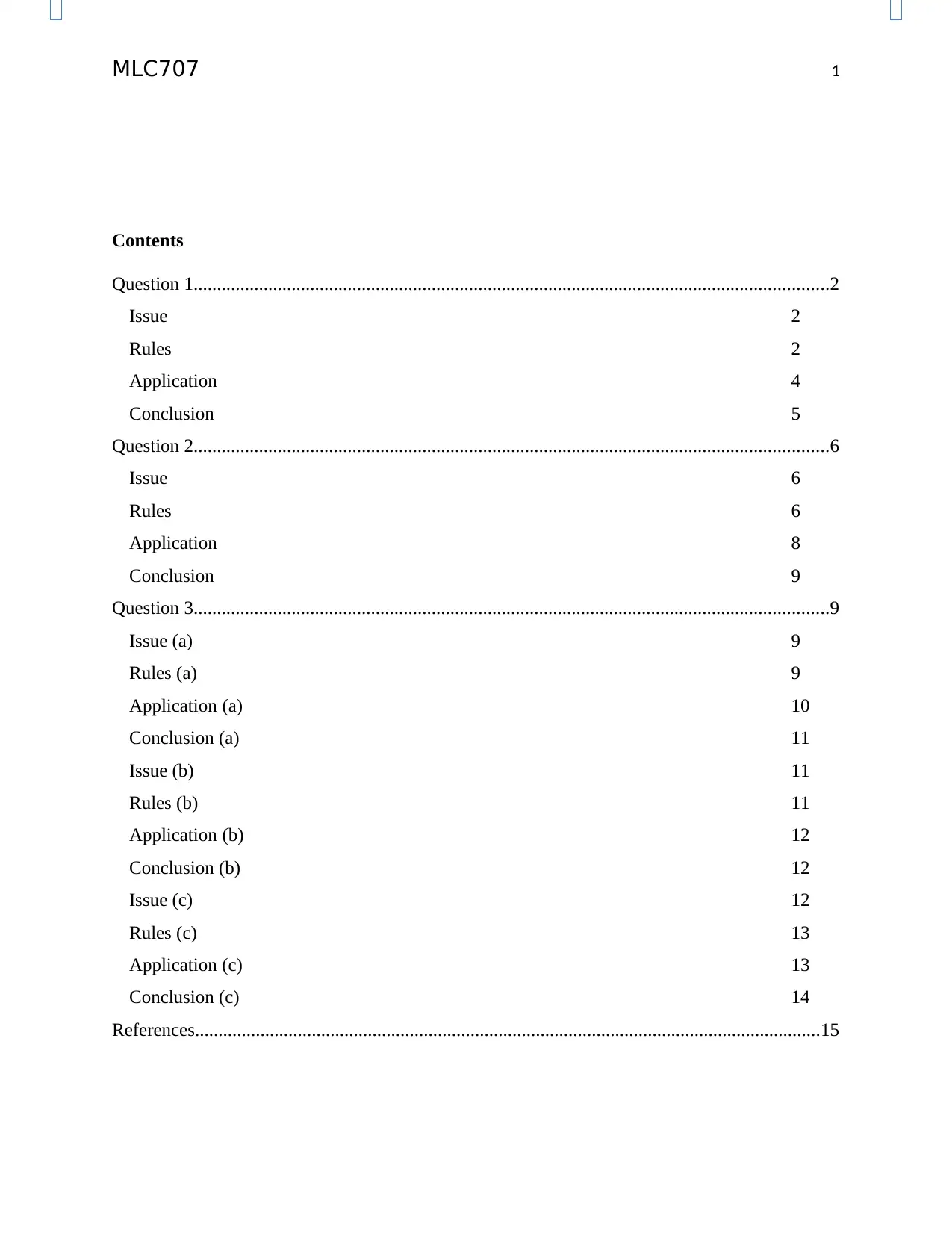
MLC707 1
Contents
Question 1........................................................................................................................................2
Issue 2
Rules 2
Application 4
Conclusion 5
Question 2........................................................................................................................................6
Issue 6
Rules 6
Application 8
Conclusion 9
Question 3........................................................................................................................................9
Issue (a) 9
Rules (a) 9
Application (a) 10
Conclusion (a) 11
Issue (b) 11
Rules (b) 11
Application (b) 12
Conclusion (b) 12
Issue (c) 12
Rules (c) 13
Application (c) 13
Conclusion (c) 14
References......................................................................................................................................15
Contents
Question 1........................................................................................................................................2
Issue 2
Rules 2
Application 4
Conclusion 5
Question 2........................................................................................................................................6
Issue 6
Rules 6
Application 8
Conclusion 9
Question 3........................................................................................................................................9
Issue (a) 9
Rules (a) 9
Application (a) 10
Conclusion (a) 11
Issue (b) 11
Rules (b) 11
Application (b) 12
Conclusion (b) 12
Issue (c) 12
Rules (c) 13
Application (c) 13
Conclusion (c) 14
References......................................................................................................................................15

MLC707 2
⊘ This is a preview!⊘
Do you want full access?
Subscribe today to unlock all pages.

Trusted by 1+ million students worldwide
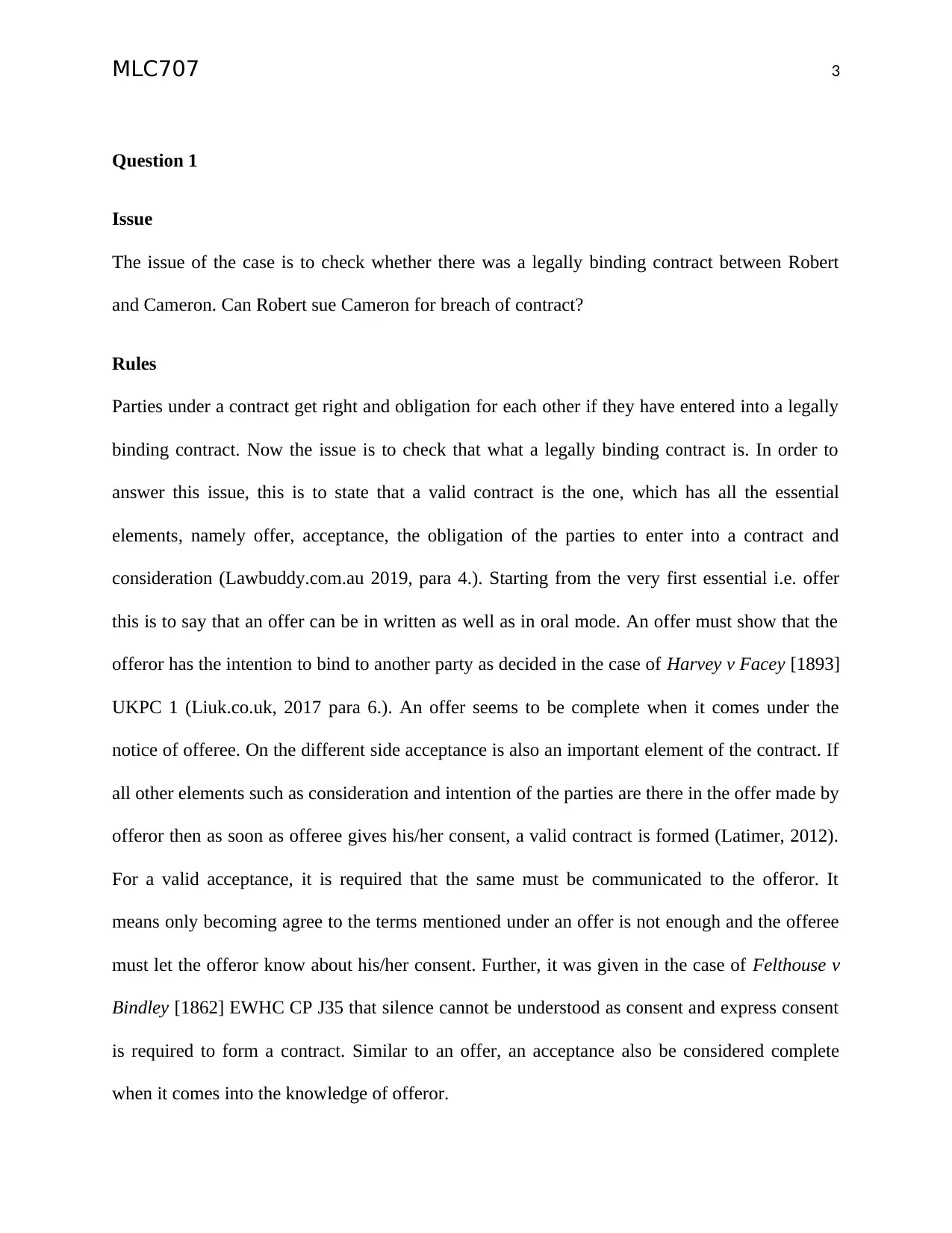
MLC707 3
Question 1
Issue
The issue of the case is to check whether there was a legally binding contract between Robert
and Cameron. Can Robert sue Cameron for breach of contract?
Rules
Parties under a contract get right and obligation for each other if they have entered into a legally
binding contract. Now the issue is to check that what a legally binding contract is. In order to
answer this issue, this is to state that a valid contract is the one, which has all the essential
elements, namely offer, acceptance, the obligation of the parties to enter into a contract and
consideration (Lawbuddy.com.au 2019, para 4.). Starting from the very first essential i.e. offer
this is to say that an offer can be in written as well as in oral mode. An offer must show that the
offeror has the intention to bind to another party as decided in the case of Harvey v Facey [1893]
UKPC 1 (Liuk.co.uk, 2017 para 6.). An offer seems to be complete when it comes under the
notice of offeree. On the different side acceptance is also an important element of the contract. If
all other elements such as consideration and intention of the parties are there in the offer made by
offeror then as soon as offeree gives his/her consent, a valid contract is formed (Latimer, 2012).
For a valid acceptance, it is required that the same must be communicated to the offeror. It
means only becoming agree to the terms mentioned under an offer is not enough and the offeree
must let the offeror know about his/her consent. Further, it was given in the case of Felthouse v
Bindley [1862] EWHC CP J35 that silence cannot be understood as consent and express consent
is required to form a contract. Similar to an offer, an acceptance also be considered complete
when it comes into the knowledge of offeror.
Question 1
Issue
The issue of the case is to check whether there was a legally binding contract between Robert
and Cameron. Can Robert sue Cameron for breach of contract?
Rules
Parties under a contract get right and obligation for each other if they have entered into a legally
binding contract. Now the issue is to check that what a legally binding contract is. In order to
answer this issue, this is to state that a valid contract is the one, which has all the essential
elements, namely offer, acceptance, the obligation of the parties to enter into a contract and
consideration (Lawbuddy.com.au 2019, para 4.). Starting from the very first essential i.e. offer
this is to say that an offer can be in written as well as in oral mode. An offer must show that the
offeror has the intention to bind to another party as decided in the case of Harvey v Facey [1893]
UKPC 1 (Liuk.co.uk, 2017 para 6.). An offer seems to be complete when it comes under the
notice of offeree. On the different side acceptance is also an important element of the contract. If
all other elements such as consideration and intention of the parties are there in the offer made by
offeror then as soon as offeree gives his/her consent, a valid contract is formed (Latimer, 2012).
For a valid acceptance, it is required that the same must be communicated to the offeror. It
means only becoming agree to the terms mentioned under an offer is not enough and the offeree
must let the offeror know about his/her consent. Further, it was given in the case of Felthouse v
Bindley [1862] EWHC CP J35 that silence cannot be understood as consent and express consent
is required to form a contract. Similar to an offer, an acceptance also be considered complete
when it comes into the knowledge of offeror.
Paraphrase This Document
Need a fresh take? Get an instant paraphrase of this document with our AI Paraphraser
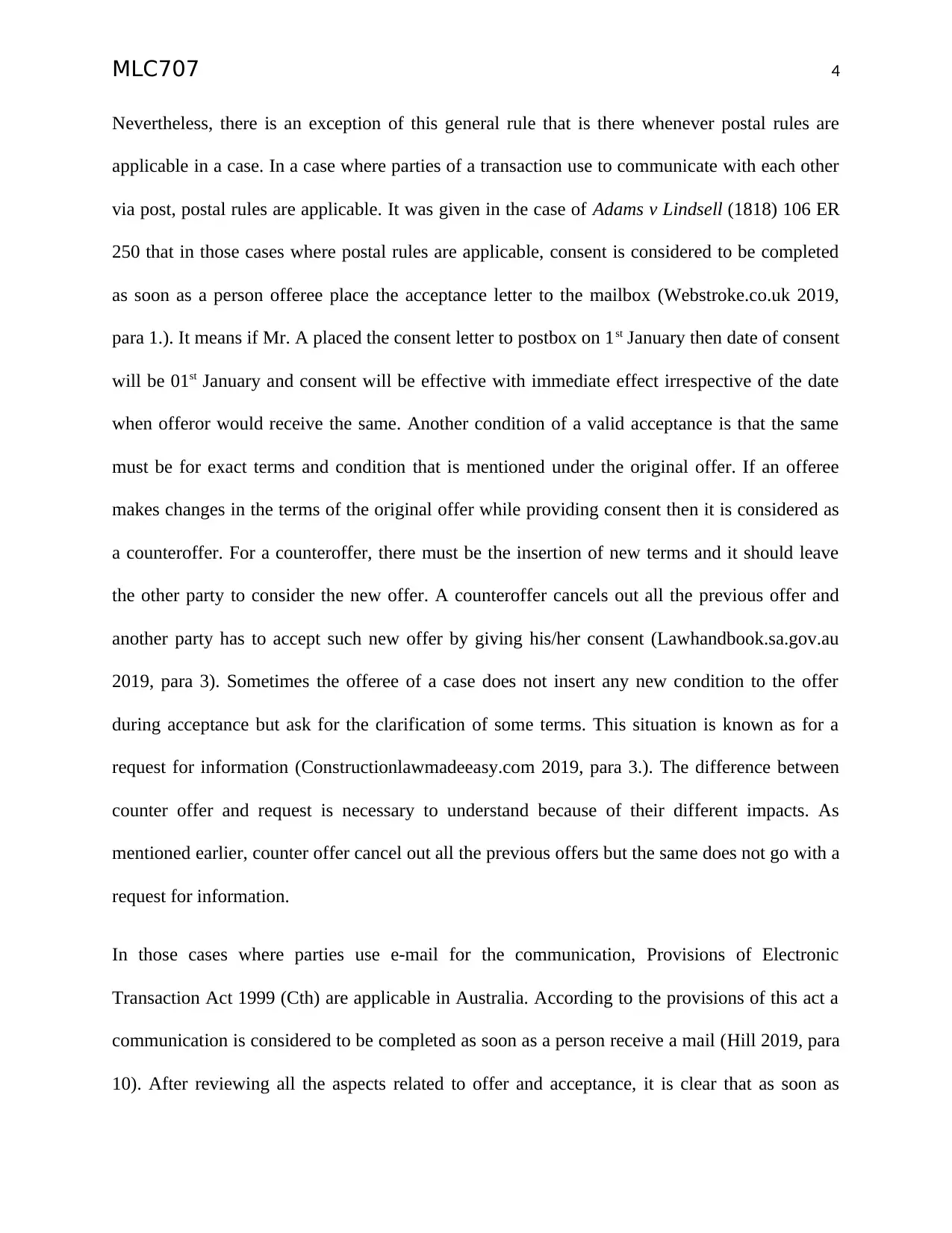
MLC707 4
Nevertheless, there is an exception of this general rule that is there whenever postal rules are
applicable in a case. In a case where parties of a transaction use to communicate with each other
via post, postal rules are applicable. It was given in the case of Adams v Lindsell (1818) 106 ER
250 that in those cases where postal rules are applicable, consent is considered to be completed
as soon as a person offeree place the acceptance letter to the mailbox (Webstroke.co.uk 2019,
para 1.). It means if Mr. A placed the consent letter to postbox on 1st January then date of consent
will be 01st January and consent will be effective with immediate effect irrespective of the date
when offeror would receive the same. Another condition of a valid acceptance is that the same
must be for exact terms and condition that is mentioned under the original offer. If an offeree
makes changes in the terms of the original offer while providing consent then it is considered as
a counteroffer. For a counteroffer, there must be the insertion of new terms and it should leave
the other party to consider the new offer. A counteroffer cancels out all the previous offer and
another party has to accept such new offer by giving his/her consent (Lawhandbook.sa.gov.au
2019, para 3). Sometimes the offeree of a case does not insert any new condition to the offer
during acceptance but ask for the clarification of some terms. This situation is known as for a
request for information (Constructionlawmadeeasy.com 2019, para 3.). The difference between
counter offer and request is necessary to understand because of their different impacts. As
mentioned earlier, counter offer cancel out all the previous offers but the same does not go with a
request for information.
In those cases where parties use e-mail for the communication, Provisions of Electronic
Transaction Act 1999 (Cth) are applicable in Australia. According to the provisions of this act a
communication is considered to be completed as soon as a person receive a mail (Hill 2019, para
10). After reviewing all the aspects related to offer and acceptance, it is clear that as soon as
Nevertheless, there is an exception of this general rule that is there whenever postal rules are
applicable in a case. In a case where parties of a transaction use to communicate with each other
via post, postal rules are applicable. It was given in the case of Adams v Lindsell (1818) 106 ER
250 that in those cases where postal rules are applicable, consent is considered to be completed
as soon as a person offeree place the acceptance letter to the mailbox (Webstroke.co.uk 2019,
para 1.). It means if Mr. A placed the consent letter to postbox on 1st January then date of consent
will be 01st January and consent will be effective with immediate effect irrespective of the date
when offeror would receive the same. Another condition of a valid acceptance is that the same
must be for exact terms and condition that is mentioned under the original offer. If an offeree
makes changes in the terms of the original offer while providing consent then it is considered as
a counteroffer. For a counteroffer, there must be the insertion of new terms and it should leave
the other party to consider the new offer. A counteroffer cancels out all the previous offer and
another party has to accept such new offer by giving his/her consent (Lawhandbook.sa.gov.au
2019, para 3). Sometimes the offeree of a case does not insert any new condition to the offer
during acceptance but ask for the clarification of some terms. This situation is known as for a
request for information (Constructionlawmadeeasy.com 2019, para 3.). The difference between
counter offer and request is necessary to understand because of their different impacts. As
mentioned earlier, counter offer cancel out all the previous offers but the same does not go with a
request for information.
In those cases where parties use e-mail for the communication, Provisions of Electronic
Transaction Act 1999 (Cth) are applicable in Australia. According to the provisions of this act a
communication is considered to be completed as soon as a person receive a mail (Hill 2019, para
10). After reviewing all the aspects related to offer and acceptance, it is clear that as soon as
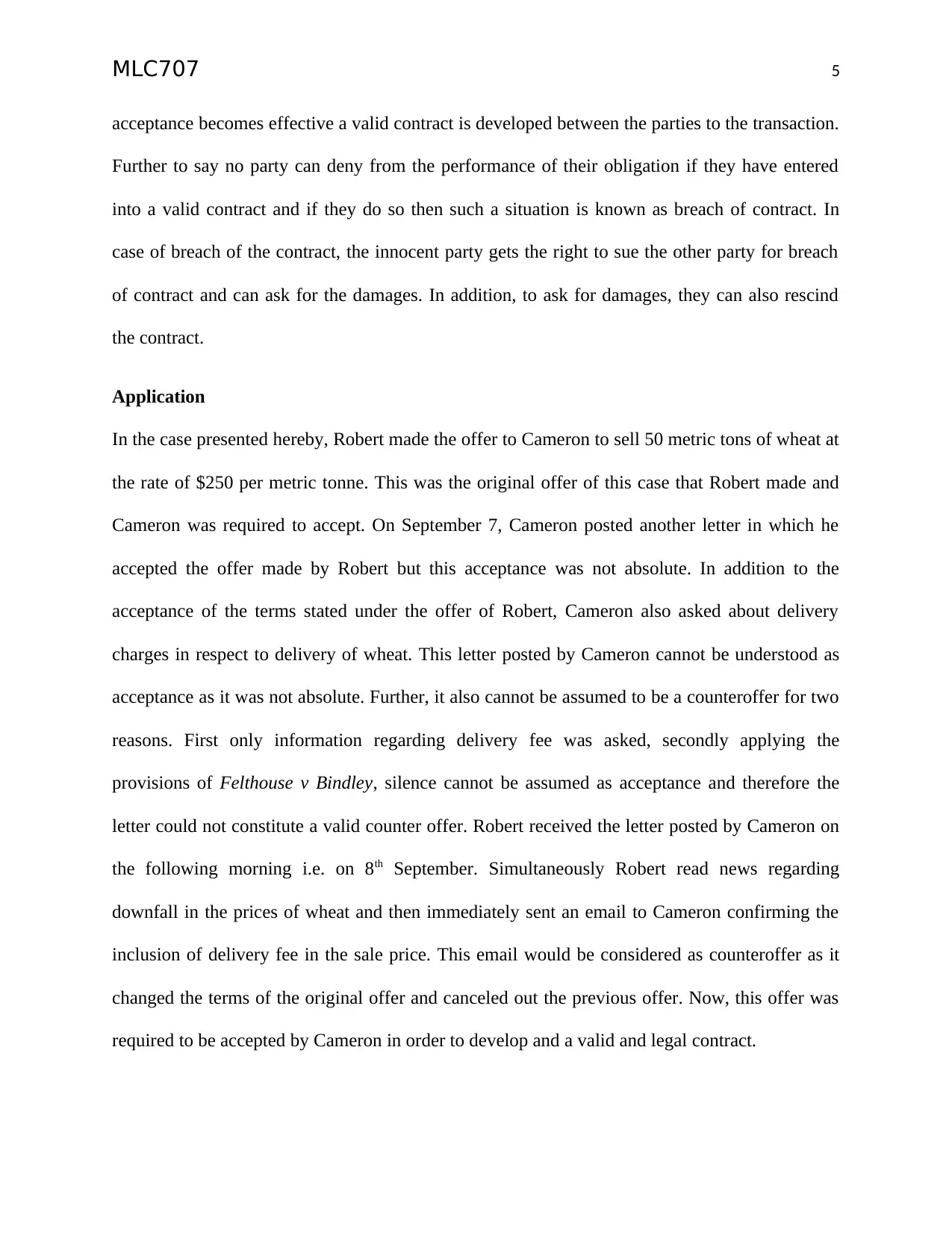
MLC707 5
acceptance becomes effective a valid contract is developed between the parties to the transaction.
Further to say no party can deny from the performance of their obligation if they have entered
into a valid contract and if they do so then such a situation is known as breach of contract. In
case of breach of the contract, the innocent party gets the right to sue the other party for breach
of contract and can ask for the damages. In addition, to ask for damages, they can also rescind
the contract.
Application
In the case presented hereby, Robert made the offer to Cameron to sell 50 metric tons of wheat at
the rate of $250 per metric tonne. This was the original offer of this case that Robert made and
Cameron was required to accept. On September 7, Cameron posted another letter in which he
accepted the offer made by Robert but this acceptance was not absolute. In addition to the
acceptance of the terms stated under the offer of Robert, Cameron also asked about delivery
charges in respect to delivery of wheat. This letter posted by Cameron cannot be understood as
acceptance as it was not absolute. Further, it also cannot be assumed to be a counteroffer for two
reasons. First only information regarding delivery fee was asked, secondly applying the
provisions of Felthouse v Bindley, silence cannot be assumed as acceptance and therefore the
letter could not constitute a valid counter offer. Robert received the letter posted by Cameron on
the following morning i.e. on 8th September. Simultaneously Robert read news regarding
downfall in the prices of wheat and then immediately sent an email to Cameron confirming the
inclusion of delivery fee in the sale price. This email would be considered as counteroffer as it
changed the terms of the original offer and canceled out the previous offer. Now, this offer was
required to be accepted by Cameron in order to develop and a valid and legal contract.
acceptance becomes effective a valid contract is developed between the parties to the transaction.
Further to say no party can deny from the performance of their obligation if they have entered
into a valid contract and if they do so then such a situation is known as breach of contract. In
case of breach of the contract, the innocent party gets the right to sue the other party for breach
of contract and can ask for the damages. In addition, to ask for damages, they can also rescind
the contract.
Application
In the case presented hereby, Robert made the offer to Cameron to sell 50 metric tons of wheat at
the rate of $250 per metric tonne. This was the original offer of this case that Robert made and
Cameron was required to accept. On September 7, Cameron posted another letter in which he
accepted the offer made by Robert but this acceptance was not absolute. In addition to the
acceptance of the terms stated under the offer of Robert, Cameron also asked about delivery
charges in respect to delivery of wheat. This letter posted by Cameron cannot be understood as
acceptance as it was not absolute. Further, it also cannot be assumed to be a counteroffer for two
reasons. First only information regarding delivery fee was asked, secondly applying the
provisions of Felthouse v Bindley, silence cannot be assumed as acceptance and therefore the
letter could not constitute a valid counter offer. Robert received the letter posted by Cameron on
the following morning i.e. on 8th September. Simultaneously Robert read news regarding
downfall in the prices of wheat and then immediately sent an email to Cameron confirming the
inclusion of delivery fee in the sale price. This email would be considered as counteroffer as it
changed the terms of the original offer and canceled out the previous offer. Now, this offer was
required to be accepted by Cameron in order to develop and a valid and legal contract.
⊘ This is a preview!⊘
Do you want full access?
Subscribe today to unlock all pages.

Trusted by 1+ million students worldwide
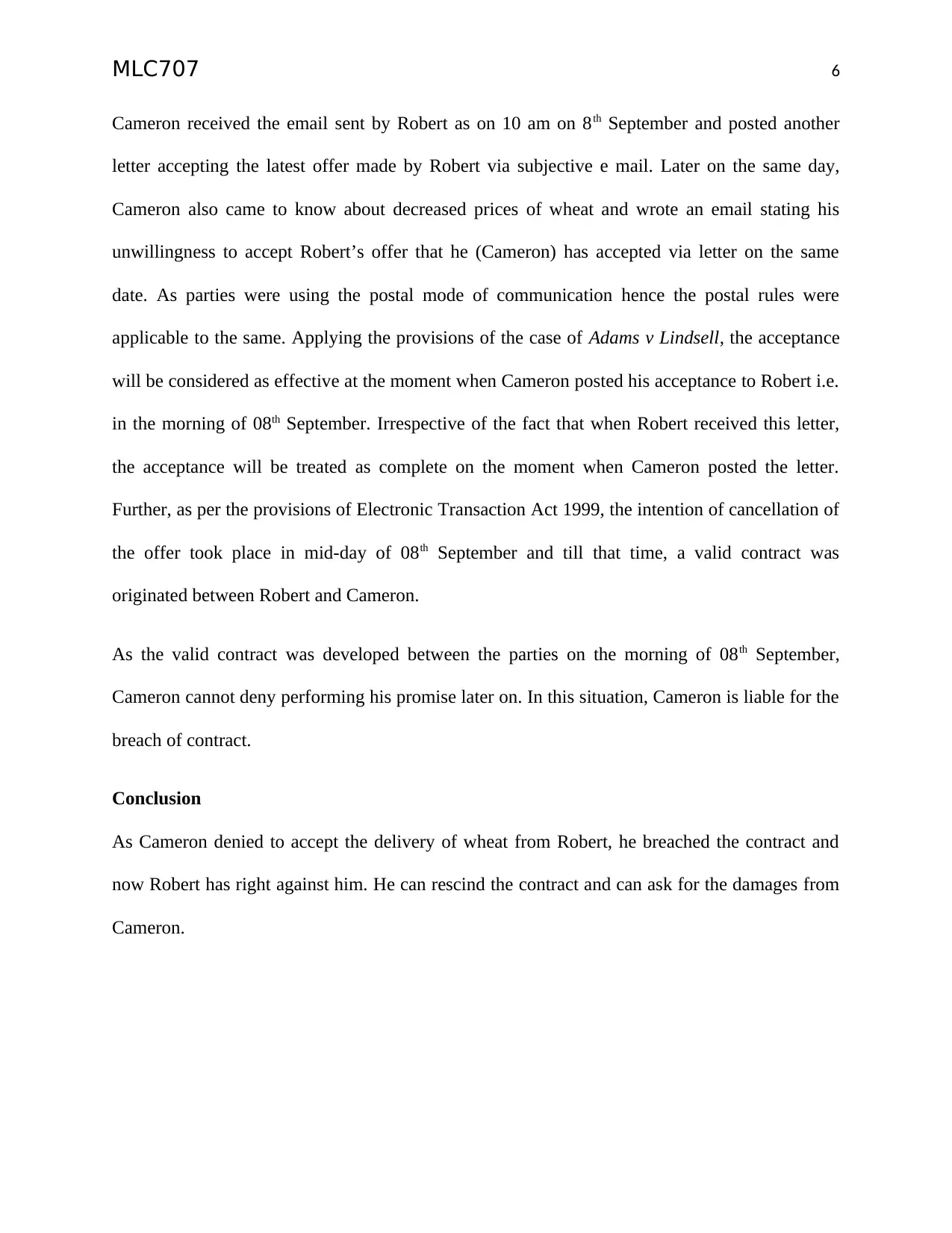
MLC707 6
Cameron received the email sent by Robert as on 10 am on 8th September and posted another
letter accepting the latest offer made by Robert via subjective e mail. Later on the same day,
Cameron also came to know about decreased prices of wheat and wrote an email stating his
unwillingness to accept Robert’s offer that he (Cameron) has accepted via letter on the same
date. As parties were using the postal mode of communication hence the postal rules were
applicable to the same. Applying the provisions of the case of Adams v Lindsell, the acceptance
will be considered as effective at the moment when Cameron posted his acceptance to Robert i.e.
in the morning of 08th September. Irrespective of the fact that when Robert received this letter,
the acceptance will be treated as complete on the moment when Cameron posted the letter.
Further, as per the provisions of Electronic Transaction Act 1999, the intention of cancellation of
the offer took place in mid-day of 08th September and till that time, a valid contract was
originated between Robert and Cameron.
As the valid contract was developed between the parties on the morning of 08th September,
Cameron cannot deny performing his promise later on. In this situation, Cameron is liable for the
breach of contract.
Conclusion
As Cameron denied to accept the delivery of wheat from Robert, he breached the contract and
now Robert has right against him. He can rescind the contract and can ask for the damages from
Cameron.
Cameron received the email sent by Robert as on 10 am on 8th September and posted another
letter accepting the latest offer made by Robert via subjective e mail. Later on the same day,
Cameron also came to know about decreased prices of wheat and wrote an email stating his
unwillingness to accept Robert’s offer that he (Cameron) has accepted via letter on the same
date. As parties were using the postal mode of communication hence the postal rules were
applicable to the same. Applying the provisions of the case of Adams v Lindsell, the acceptance
will be considered as effective at the moment when Cameron posted his acceptance to Robert i.e.
in the morning of 08th September. Irrespective of the fact that when Robert received this letter,
the acceptance will be treated as complete on the moment when Cameron posted the letter.
Further, as per the provisions of Electronic Transaction Act 1999, the intention of cancellation of
the offer took place in mid-day of 08th September and till that time, a valid contract was
originated between Robert and Cameron.
As the valid contract was developed between the parties on the morning of 08th September,
Cameron cannot deny performing his promise later on. In this situation, Cameron is liable for the
breach of contract.
Conclusion
As Cameron denied to accept the delivery of wheat from Robert, he breached the contract and
now Robert has right against him. He can rescind the contract and can ask for the damages from
Cameron.
Paraphrase This Document
Need a fresh take? Get an instant paraphrase of this document with our AI Paraphraser
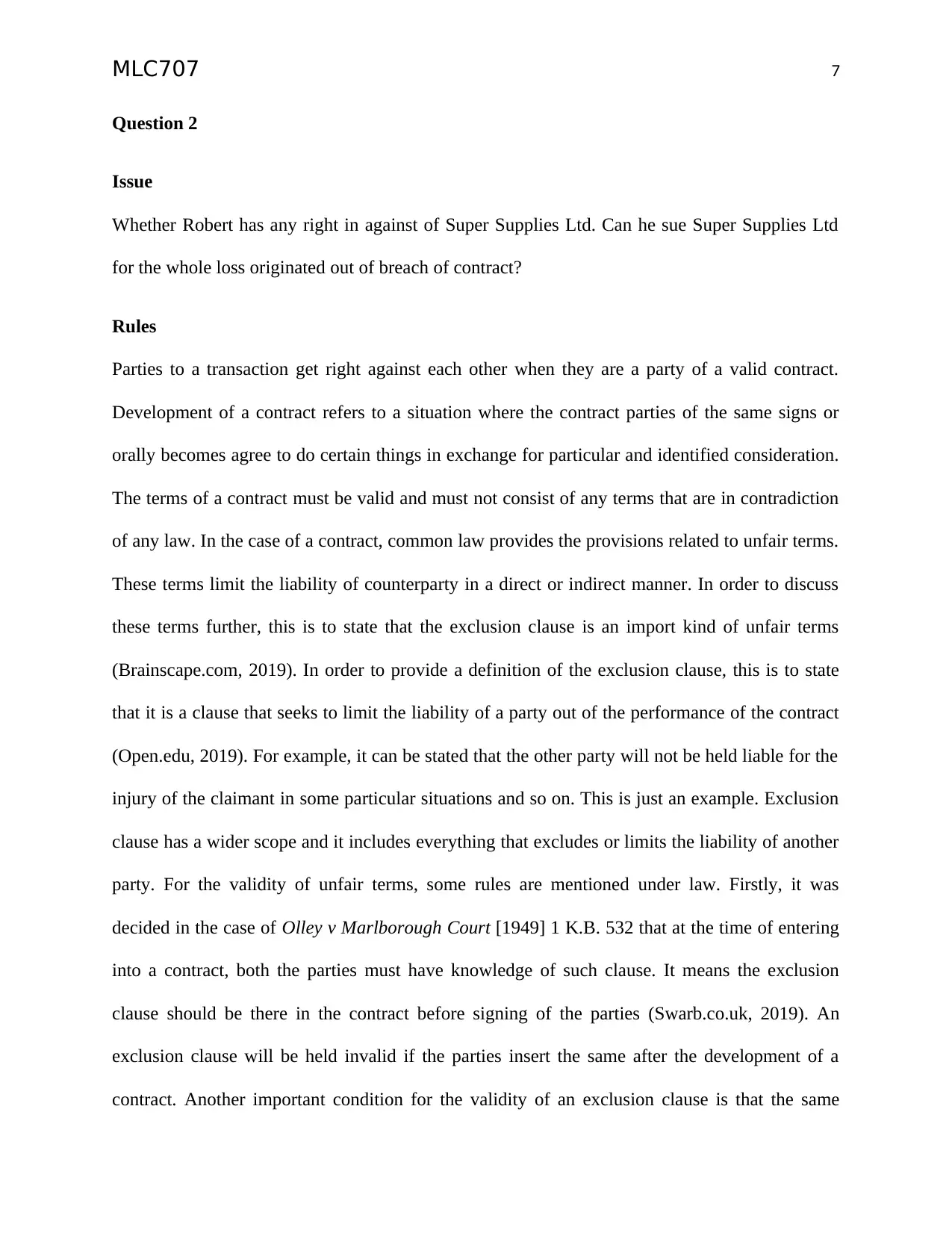
MLC707 7
Question 2
Issue
Whether Robert has any right in against of Super Supplies Ltd. Can he sue Super Supplies Ltd
for the whole loss originated out of breach of contract?
Rules
Parties to a transaction get right against each other when they are a party of a valid contract.
Development of a contract refers to a situation where the contract parties of the same signs or
orally becomes agree to do certain things in exchange for particular and identified consideration.
The terms of a contract must be valid and must not consist of any terms that are in contradiction
of any law. In the case of a contract, common law provides the provisions related to unfair terms.
These terms limit the liability of counterparty in a direct or indirect manner. In order to discuss
these terms further, this is to state that the exclusion clause is an import kind of unfair terms
(Brainscape.com, 2019). In order to provide a definition of the exclusion clause, this is to state
that it is a clause that seeks to limit the liability of a party out of the performance of the contract
(Open.edu, 2019). For example, it can be stated that the other party will not be held liable for the
injury of the claimant in some particular situations and so on. This is just an example. Exclusion
clause has a wider scope and it includes everything that excludes or limits the liability of another
party. For the validity of unfair terms, some rules are mentioned under law. Firstly, it was
decided in the case of Olley v Marlborough Court [1949] 1 K.B. 532 that at the time of entering
into a contract, both the parties must have knowledge of such clause. It means the exclusion
clause should be there in the contract before signing of the parties (Swarb.co.uk, 2019). An
exclusion clause will be held invalid if the parties insert the same after the development of a
contract. Another important condition for the validity of an exclusion clause is that the same
Question 2
Issue
Whether Robert has any right in against of Super Supplies Ltd. Can he sue Super Supplies Ltd
for the whole loss originated out of breach of contract?
Rules
Parties to a transaction get right against each other when they are a party of a valid contract.
Development of a contract refers to a situation where the contract parties of the same signs or
orally becomes agree to do certain things in exchange for particular and identified consideration.
The terms of a contract must be valid and must not consist of any terms that are in contradiction
of any law. In the case of a contract, common law provides the provisions related to unfair terms.
These terms limit the liability of counterparty in a direct or indirect manner. In order to discuss
these terms further, this is to state that the exclusion clause is an import kind of unfair terms
(Brainscape.com, 2019). In order to provide a definition of the exclusion clause, this is to state
that it is a clause that seeks to limit the liability of a party out of the performance of the contract
(Open.edu, 2019). For example, it can be stated that the other party will not be held liable for the
injury of the claimant in some particular situations and so on. This is just an example. Exclusion
clause has a wider scope and it includes everything that excludes or limits the liability of another
party. For the validity of unfair terms, some rules are mentioned under law. Firstly, it was
decided in the case of Olley v Marlborough Court [1949] 1 K.B. 532 that at the time of entering
into a contract, both the parties must have knowledge of such clause. It means the exclusion
clause should be there in the contract before signing of the parties (Swarb.co.uk, 2019). An
exclusion clause will be held invalid if the parties insert the same after the development of a
contract. Another important condition for the validity of an exclusion clause is that the same
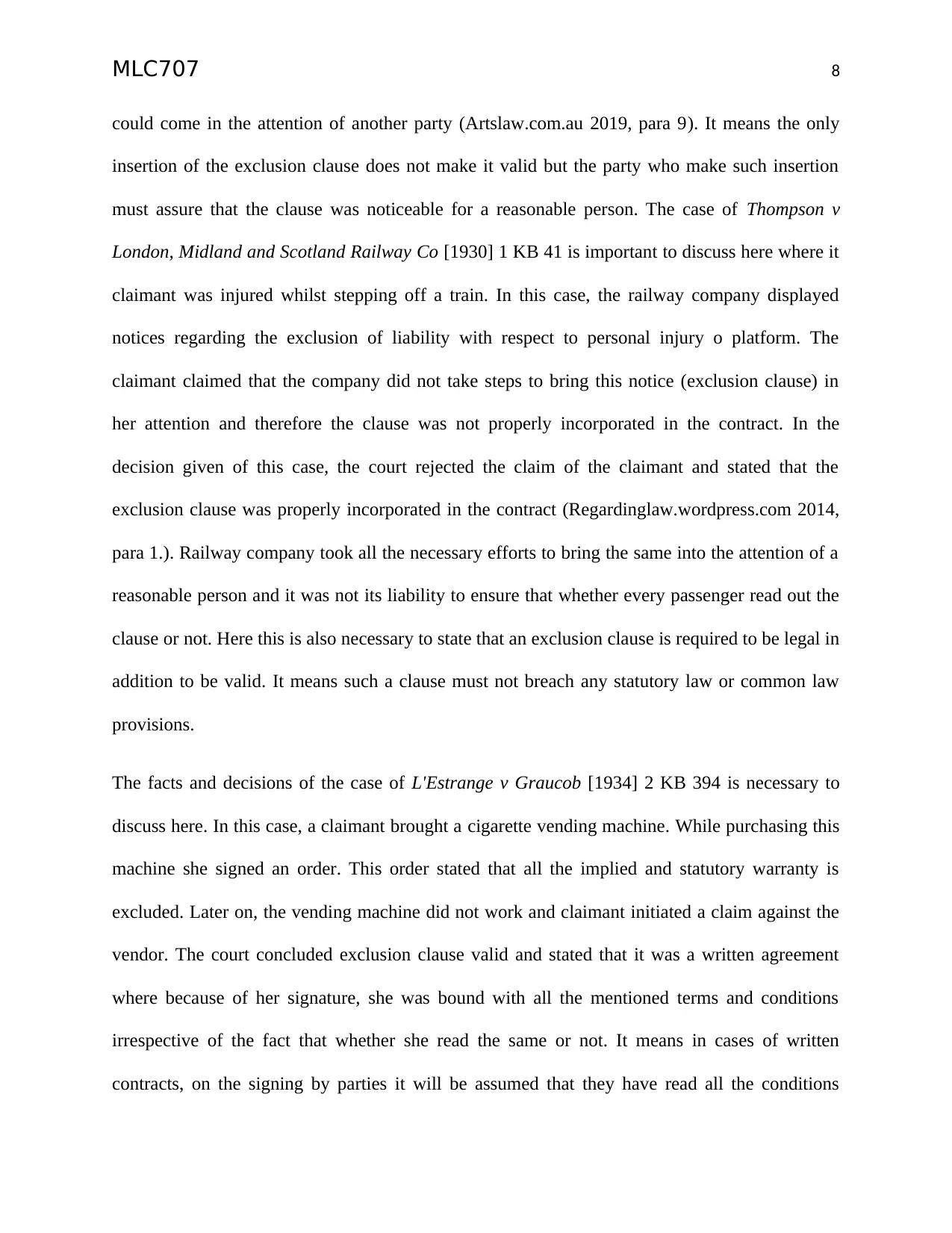
MLC707 8
could come in the attention of another party (Artslaw.com.au 2019, para 9). It means the only
insertion of the exclusion clause does not make it valid but the party who make such insertion
must assure that the clause was noticeable for a reasonable person. The case of Thompson v
London, Midland and Scotland Railway Co [1930] 1 KB 41 is important to discuss here where it
claimant was injured whilst stepping off a train. In this case, the railway company displayed
notices regarding the exclusion of liability with respect to personal injury o platform. The
claimant claimed that the company did not take steps to bring this notice (exclusion clause) in
her attention and therefore the clause was not properly incorporated in the contract. In the
decision given of this case, the court rejected the claim of the claimant and stated that the
exclusion clause was properly incorporated in the contract (Regardinglaw.wordpress.com 2014,
para 1.). Railway company took all the necessary efforts to bring the same into the attention of a
reasonable person and it was not its liability to ensure that whether every passenger read out the
clause or not. Here this is also necessary to state that an exclusion clause is required to be legal in
addition to be valid. It means such a clause must not breach any statutory law or common law
provisions.
The facts and decisions of the case of L'Estrange v Graucob [1934] 2 KB 394 is necessary to
discuss here. In this case, a claimant brought a cigarette vending machine. While purchasing this
machine she signed an order. This order stated that all the implied and statutory warranty is
excluded. Later on, the vending machine did not work and claimant initiated a claim against the
vendor. The court concluded exclusion clause valid and stated that it was a written agreement
where because of her signature, she was bound with all the mentioned terms and conditions
irrespective of the fact that whether she read the same or not. It means in cases of written
contracts, on the signing by parties it will be assumed that they have read all the conditions
could come in the attention of another party (Artslaw.com.au 2019, para 9). It means the only
insertion of the exclusion clause does not make it valid but the party who make such insertion
must assure that the clause was noticeable for a reasonable person. The case of Thompson v
London, Midland and Scotland Railway Co [1930] 1 KB 41 is important to discuss here where it
claimant was injured whilst stepping off a train. In this case, the railway company displayed
notices regarding the exclusion of liability with respect to personal injury o platform. The
claimant claimed that the company did not take steps to bring this notice (exclusion clause) in
her attention and therefore the clause was not properly incorporated in the contract. In the
decision given of this case, the court rejected the claim of the claimant and stated that the
exclusion clause was properly incorporated in the contract (Regardinglaw.wordpress.com 2014,
para 1.). Railway company took all the necessary efforts to bring the same into the attention of a
reasonable person and it was not its liability to ensure that whether every passenger read out the
clause or not. Here this is also necessary to state that an exclusion clause is required to be legal in
addition to be valid. It means such a clause must not breach any statutory law or common law
provisions.
The facts and decisions of the case of L'Estrange v Graucob [1934] 2 KB 394 is necessary to
discuss here. In this case, a claimant brought a cigarette vending machine. While purchasing this
machine she signed an order. This order stated that all the implied and statutory warranty is
excluded. Later on, the vending machine did not work and claimant initiated a claim against the
vendor. The court concluded exclusion clause valid and stated that it was a written agreement
where because of her signature, she was bound with all the mentioned terms and conditions
irrespective of the fact that whether she read the same or not. It means in cases of written
contracts, on the signing by parties it will be assumed that they have read all the conditions
⊘ This is a preview!⊘
Do you want full access?
Subscribe today to unlock all pages.

Trusted by 1+ million students worldwide
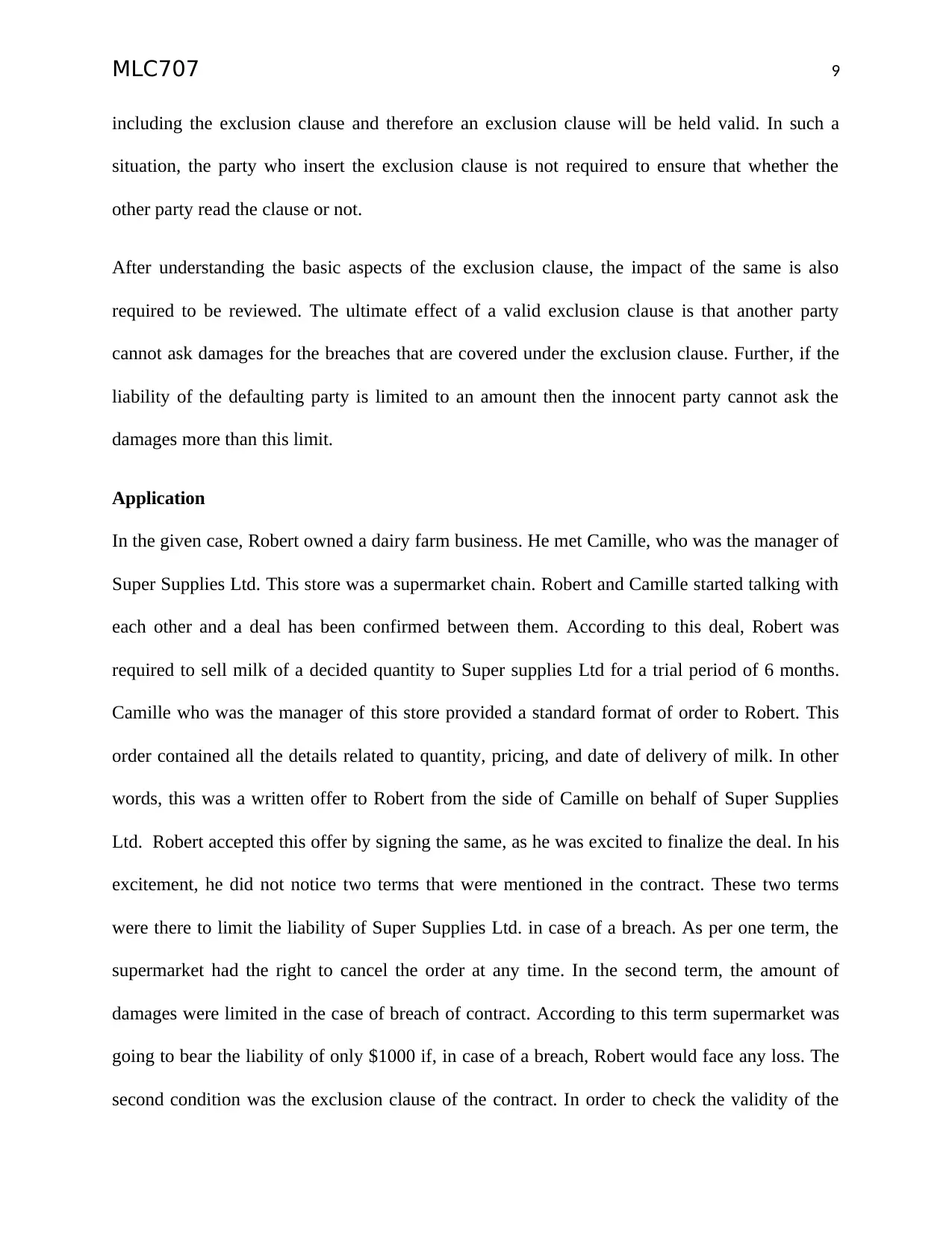
MLC707 9
including the exclusion clause and therefore an exclusion clause will be held valid. In such a
situation, the party who insert the exclusion clause is not required to ensure that whether the
other party read the clause or not.
After understanding the basic aspects of the exclusion clause, the impact of the same is also
required to be reviewed. The ultimate effect of a valid exclusion clause is that another party
cannot ask damages for the breaches that are covered under the exclusion clause. Further, if the
liability of the defaulting party is limited to an amount then the innocent party cannot ask the
damages more than this limit.
Application
In the given case, Robert owned a dairy farm business. He met Camille, who was the manager of
Super Supplies Ltd. This store was a supermarket chain. Robert and Camille started talking with
each other and a deal has been confirmed between them. According to this deal, Robert was
required to sell milk of a decided quantity to Super supplies Ltd for a trial period of 6 months.
Camille who was the manager of this store provided a standard format of order to Robert. This
order contained all the details related to quantity, pricing, and date of delivery of milk. In other
words, this was a written offer to Robert from the side of Camille on behalf of Super Supplies
Ltd. Robert accepted this offer by signing the same, as he was excited to finalize the deal. In his
excitement, he did not notice two terms that were mentioned in the contract. These two terms
were there to limit the liability of Super Supplies Ltd. in case of a breach. As per one term, the
supermarket had the right to cancel the order at any time. In the second term, the amount of
damages were limited in the case of breach of contract. According to this term supermarket was
going to bear the liability of only $1000 if, in case of a breach, Robert would face any loss. The
second condition was the exclusion clause of the contract. In order to check the validity of the
including the exclusion clause and therefore an exclusion clause will be held valid. In such a
situation, the party who insert the exclusion clause is not required to ensure that whether the
other party read the clause or not.
After understanding the basic aspects of the exclusion clause, the impact of the same is also
required to be reviewed. The ultimate effect of a valid exclusion clause is that another party
cannot ask damages for the breaches that are covered under the exclusion clause. Further, if the
liability of the defaulting party is limited to an amount then the innocent party cannot ask the
damages more than this limit.
Application
In the given case, Robert owned a dairy farm business. He met Camille, who was the manager of
Super Supplies Ltd. This store was a supermarket chain. Robert and Camille started talking with
each other and a deal has been confirmed between them. According to this deal, Robert was
required to sell milk of a decided quantity to Super supplies Ltd for a trial period of 6 months.
Camille who was the manager of this store provided a standard format of order to Robert. This
order contained all the details related to quantity, pricing, and date of delivery of milk. In other
words, this was a written offer to Robert from the side of Camille on behalf of Super Supplies
Ltd. Robert accepted this offer by signing the same, as he was excited to finalize the deal. In his
excitement, he did not notice two terms that were mentioned in the contract. These two terms
were there to limit the liability of Super Supplies Ltd. in case of a breach. As per one term, the
supermarket had the right to cancel the order at any time. In the second term, the amount of
damages were limited in the case of breach of contract. According to this term supermarket was
going to bear the liability of only $1000 if, in case of a breach, Robert would face any loss. The
second condition was the exclusion clause of the contract. In order to check the validity of the
Paraphrase This Document
Need a fresh take? Get an instant paraphrase of this document with our AI Paraphraser
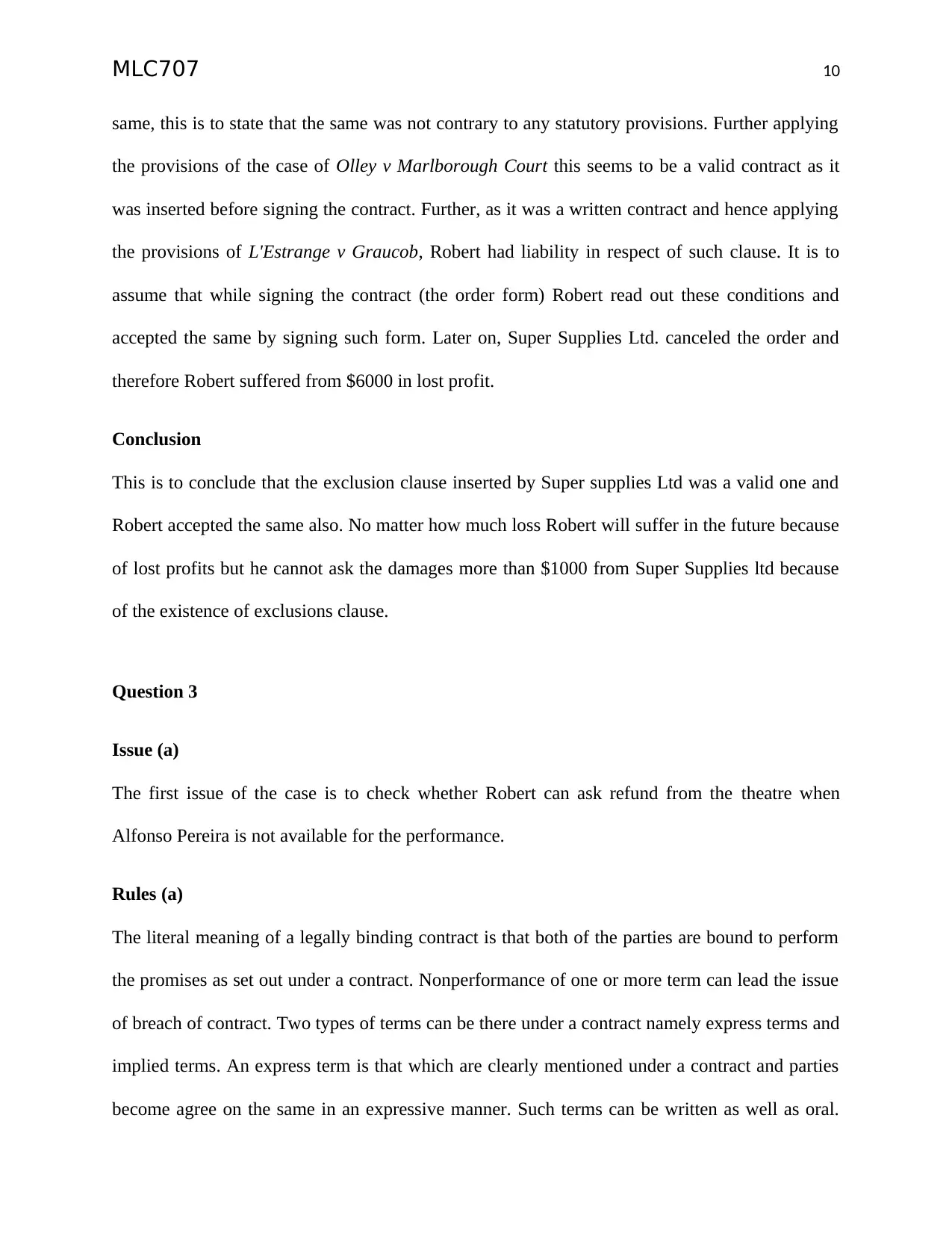
MLC707 10
same, this is to state that the same was not contrary to any statutory provisions. Further applying
the provisions of the case of Olley v Marlborough Court this seems to be a valid contract as it
was inserted before signing the contract. Further, as it was a written contract and hence applying
the provisions of L'Estrange v Graucob, Robert had liability in respect of such clause. It is to
assume that while signing the contract (the order form) Robert read out these conditions and
accepted the same by signing such form. Later on, Super Supplies Ltd. canceled the order and
therefore Robert suffered from $6000 in lost profit.
Conclusion
This is to conclude that the exclusion clause inserted by Super supplies Ltd was a valid one and
Robert accepted the same also. No matter how much loss Robert will suffer in the future because
of lost profits but he cannot ask the damages more than $1000 from Super Supplies ltd because
of the existence of exclusions clause.
Question 3
Issue (a)
The first issue of the case is to check whether Robert can ask refund from the theatre when
Alfonso Pereira is not available for the performance.
Rules (a)
The literal meaning of a legally binding contract is that both of the parties are bound to perform
the promises as set out under a contract. Nonperformance of one or more term can lead the issue
of breach of contract. Two types of terms can be there under a contract namely express terms and
implied terms. An express term is that which are clearly mentioned under a contract and parties
become agree on the same in an expressive manner. Such terms can be written as well as oral.
same, this is to state that the same was not contrary to any statutory provisions. Further applying
the provisions of the case of Olley v Marlborough Court this seems to be a valid contract as it
was inserted before signing the contract. Further, as it was a written contract and hence applying
the provisions of L'Estrange v Graucob, Robert had liability in respect of such clause. It is to
assume that while signing the contract (the order form) Robert read out these conditions and
accepted the same by signing such form. Later on, Super Supplies Ltd. canceled the order and
therefore Robert suffered from $6000 in lost profit.
Conclusion
This is to conclude that the exclusion clause inserted by Super supplies Ltd was a valid one and
Robert accepted the same also. No matter how much loss Robert will suffer in the future because
of lost profits but he cannot ask the damages more than $1000 from Super Supplies ltd because
of the existence of exclusions clause.
Question 3
Issue (a)
The first issue of the case is to check whether Robert can ask refund from the theatre when
Alfonso Pereira is not available for the performance.
Rules (a)
The literal meaning of a legally binding contract is that both of the parties are bound to perform
the promises as set out under a contract. Nonperformance of one or more term can lead the issue
of breach of contract. Two types of terms can be there under a contract namely express terms and
implied terms. An express term is that which are clearly mentioned under a contract and parties
become agree on the same in an expressive manner. Such terms can be written as well as oral.
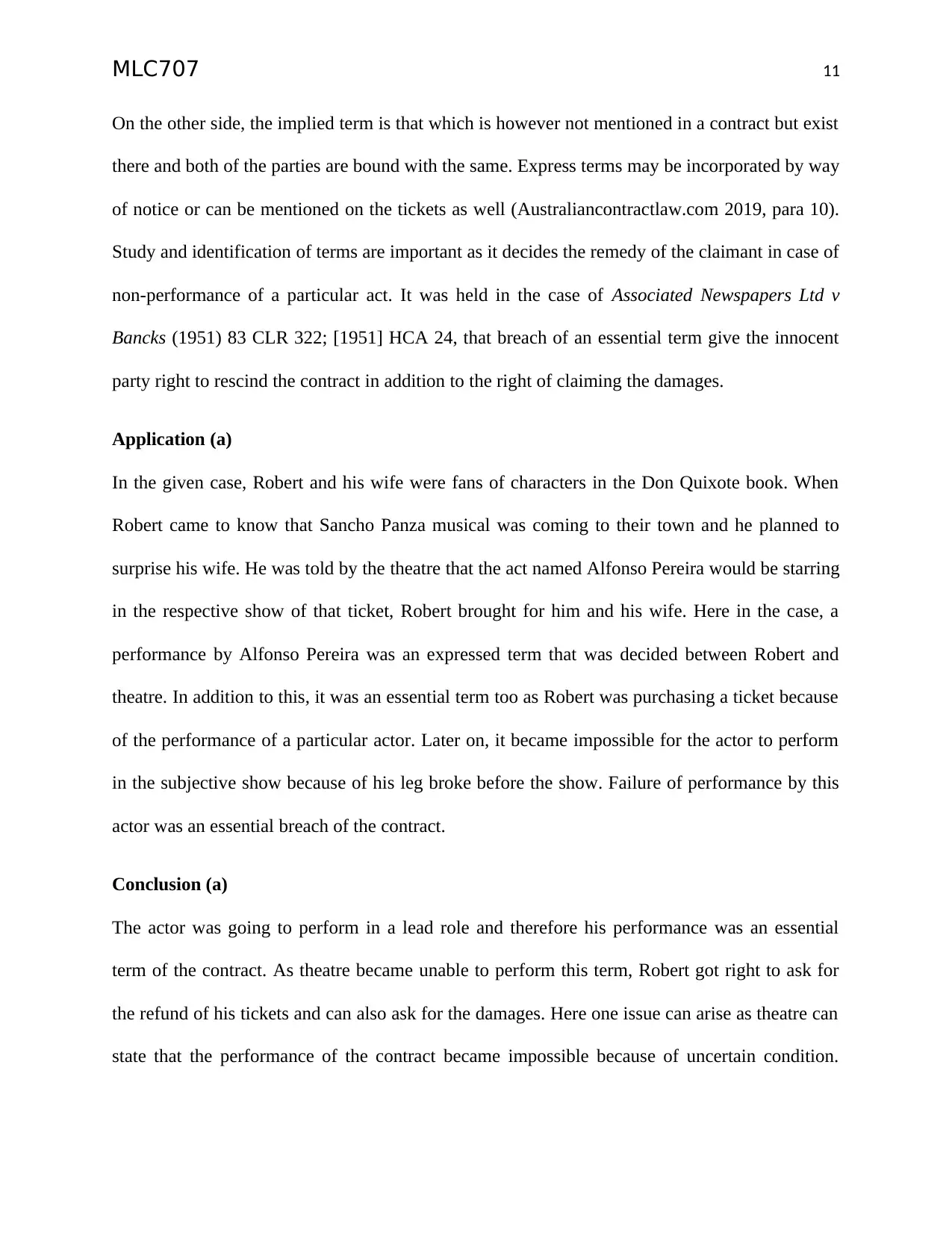
MLC707 11
On the other side, the implied term is that which is however not mentioned in a contract but exist
there and both of the parties are bound with the same. Express terms may be incorporated by way
of notice or can be mentioned on the tickets as well (Australiancontractlaw.com 2019, para 10).
Study and identification of terms are important as it decides the remedy of the claimant in case of
non-performance of a particular act. It was held in the case of Associated Newspapers Ltd v
Bancks (1951) 83 CLR 322; [1951] HCA 24, that breach of an essential term give the innocent
party right to rescind the contract in addition to the right of claiming the damages.
Application (a)
In the given case, Robert and his wife were fans of characters in the Don Quixote book. When
Robert came to know that Sancho Panza musical was coming to their town and he planned to
surprise his wife. He was told by the theatre that the act named Alfonso Pereira would be starring
in the respective show of that ticket, Robert brought for him and his wife. Here in the case, a
performance by Alfonso Pereira was an expressed term that was decided between Robert and
theatre. In addition to this, it was an essential term too as Robert was purchasing a ticket because
of the performance of a particular actor. Later on, it became impossible for the actor to perform
in the subjective show because of his leg broke before the show. Failure of performance by this
actor was an essential breach of the contract.
Conclusion (a)
The actor was going to perform in a lead role and therefore his performance was an essential
term of the contract. As theatre became unable to perform this term, Robert got right to ask for
the refund of his tickets and can also ask for the damages. Here one issue can arise as theatre can
state that the performance of the contract became impossible because of uncertain condition.
On the other side, the implied term is that which is however not mentioned in a contract but exist
there and both of the parties are bound with the same. Express terms may be incorporated by way
of notice or can be mentioned on the tickets as well (Australiancontractlaw.com 2019, para 10).
Study and identification of terms are important as it decides the remedy of the claimant in case of
non-performance of a particular act. It was held in the case of Associated Newspapers Ltd v
Bancks (1951) 83 CLR 322; [1951] HCA 24, that breach of an essential term give the innocent
party right to rescind the contract in addition to the right of claiming the damages.
Application (a)
In the given case, Robert and his wife were fans of characters in the Don Quixote book. When
Robert came to know that Sancho Panza musical was coming to their town and he planned to
surprise his wife. He was told by the theatre that the act named Alfonso Pereira would be starring
in the respective show of that ticket, Robert brought for him and his wife. Here in the case, a
performance by Alfonso Pereira was an expressed term that was decided between Robert and
theatre. In addition to this, it was an essential term too as Robert was purchasing a ticket because
of the performance of a particular actor. Later on, it became impossible for the actor to perform
in the subjective show because of his leg broke before the show. Failure of performance by this
actor was an essential breach of the contract.
Conclusion (a)
The actor was going to perform in a lead role and therefore his performance was an essential
term of the contract. As theatre became unable to perform this term, Robert got right to ask for
the refund of his tickets and can also ask for the damages. Here one issue can arise as theatre can
state that the performance of the contract became impossible because of uncertain condition.
⊘ This is a preview!⊘
Do you want full access?
Subscribe today to unlock all pages.

Trusted by 1+ million students worldwide
1 out of 19
Related Documents
Your All-in-One AI-Powered Toolkit for Academic Success.
+13062052269
info@desklib.com
Available 24*7 on WhatsApp / Email
![[object Object]](/_next/static/media/star-bottom.7253800d.svg)
Unlock your academic potential
Copyright © 2020–2026 A2Z Services. All Rights Reserved. Developed and managed by ZUCOL.




